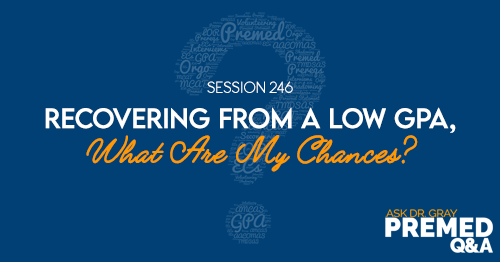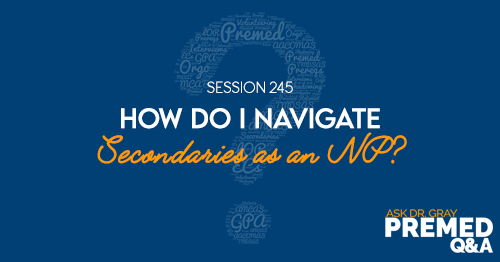Apple Podcasts | Google Podcasts
Session 235
The journey to medical school can be challenging, especially for students, just like this 2.8 student today, who faced academic setbacks throughout undergrad. While there is no one-size-fits-all approach, let’s explore some strategies to effectively showcase academic capability.
Ask Dr. Gray: Premed Q&A is brought to you by Blueprint MCAT. Listen to this podcast episode with the player above, or keep reading for the highlights and takeaway points.
The episodes in this podcast are recordings of our Facebook Live that we do at 3 pm Eastern on most weekdays. Check out our Facebook page and like the page to be notified. Also, listen to our other podcasts on MedEd Media. If you have any questions, call me at 617-410-6747.
Question of the Day: Will Taking an SMP Help a 2.8 Undergrad GPA?
“I am a nontraditional premed student. I’ve been out of college since 2021. I do have a pretty interesting trend in my GPA because I didn’t go into college thinking I wanted to be premed. I was already a little behind when I started taking my premed classes. I guess the whole reason why I went into premed also took a toll on me grade-wise and academic-wise. So it wasn’t until, honestly, COVID that I was able to really get my act together.
I’m actually doing an SMP after I graduate. But I’m worried that because of my science GPA, and just the amount of credits I have, even taking more classes undergrad or even this SMP won’t really help me in my applications and will get me screened out. So I just wanted to hear some extra advice. I know you talk a lot about upward trends. I have Mappd and the trend is still a lot of up and down.”
Finding Clarity in What She Wants to Do
Looking at this student’s Mappd account, we can see 2.04 and 2.82 for the first two, which are relatively flat. Junior year is still not great as well as her Senior year at 3.0. So she’s basically a 2.8 student all through undergrad. And then postbac, she finally turned it around, which is good.
- This student didn’t have a clear idea of what she wanted to do initially. She always had an affinity for biology, so she decided to explore it further. It wasn’t until one of her biology TAs suggested joining a premed co-ed fraternity group that she started to consider pursuing a career in healthcare. They encouraged her to engage in pre-health activities and broaden her horizons. However, she didn’t take many prerequisites until her sophomore year, as she had only completed biology and general chemistry courses.
Finding Passion for Medicine and Research
- What truly sparked her interest in medicine and altered her trajectory occurred during her sophomore year’s winter break when she lost a friend to an overdose. This devastating event completely shifted her perspective on medicine. This gave her the determination to seek answers and understand the circumstances surrounding her friend’s passing, as they were around the same age. She was feeling confused and wanting clarity.
- After discovering that her school offered a degree in neuroscience, she got intrigued, and hoping to find answers, she decided to pursue it. Through her neuroscience studies, she developed a passion for both medicine and research. She had the opportunity to delve into fascinating topics and write theses on various medical subjects. One of her favorite classes was psychopharmacology, which inspired her to apply for her current job at a hospital. Working at the hospital and witnessing medical concepts come to life in a clinical setting, including involvement in clinical trials, further solidified her interest in the field.
-
Figuring Things Out that Led Her to Course-Correct
- Reflecting on that dark period of her life, she realized the importance of prioritizing her mental health alongside her academic workload. Recognizing the impact it had on her grades and overall well-being, she has since made significant improvements. Her current job provides the opportunity to take undergraduate-level science classes, which she has utilized to demonstrate an upward trend in her academic performance.
- Despite these positive changes, she acknowledges that she might not be in the best position to apply to medical school for the next year or two. She understands the need to strengthen her qualifications through a post-baccalaureate or special master’s program. As a result, she applied to multiple programs and plans to attend one in the fall.
-
Activities Do Not Make Up for Poor Grades
- This student admits that since her grades are not great, she has compensated for this by accumulating a variety of experiences and hours. However, she is concerned about whether even with a Special Master’s Program (SMP), she will be in a favorable position to apply to medical school.
Medical schools have to make sure that you are academically capable of doing well in med school. Because this gives them the confidence that when they accept you, you’re actually going to finish. Otherwise, it’s going to look bad for them and it will also look bad for you, cost-wise, to be accepted to a program and then fail out because you couldn’t handle it. And so, they have to make sure, first and foremost, that you are academically capable of doing well in med school.
“Medical schools won't care about your activities until you prove academic capability.”Click To TweetHow to Prove Academic Capability
The journey to medical school can be challenging, especially for students, like this student, who have struggled academically in the past. The question is: How can you prove academic capability?
The reality is that there’s no one-size-fits-all answer. With over 200 medical schools in the country, each admissions committee has its own criteria and preferences. However, there are strategies that can help showcase academic capabilities effectively.
Understand different perspectives.
Admissions committees vary in their expectations for academic capability. It’s crucial to acknowledge that not every school will be satisfied with your approach. Some may value a strong postbac program with a high GPA, while others may prefer a larger number of undergraduate-level credits. Some may even question the choice of pursuing graduate-level coursework, favoring undergraduate-level coursework as a demonstration of academic ability.
Embrace your unique journey.
It’s important to come to terms with the fact that you won’t be able to please every admissions committee. Instead, focus on proving your academic capability in the best way possible given your individual circumstances. Consider the resources available to you, such as scholarships or loans for graduate-level programs like SMP (Special Master’s Program). If pursuing an SMP is the most practical option for you, don’t hesitate to take that path.
Be confident in your choices.
While some medical schools might not approve of an SMP, it’s essential to be confident in your chosen approach. Understand that there will be institutions that appreciate your unique journey and recognize the value of your SMP experience. Be aware that rejection based on undergraduate GPA is a possibility, but it doesn’t invalidate your potential for success.
Focus only on the things you can control.
There are things that you can control and there are also things that you can’t control. Unfortunately, most students focus on the things that matter that aren’t in their control. Don’t try to figure out what the rules of the game are, when the rules aren’t even published anywhere.
'The only thing that you can control is how well you do.'Click To TweetThe Importance of Completing SMP or Postbac Programs Before Applying to Medical School
Mistake: Applying to Medical School Midway Through SMP or Postbac
One of the most common mistakes I observe is students applying to medical school before completing their SMP or postbac program, or even in the middle of it. Essentially, they are saying to medical schools that they need to work on their grades and they hope to show their improvements later. However, medical schools typically don’t have the time or flexibility to accommodate this approach.
Advice: Finish Your Coursework Before Applying
One of the most valuable pieces of advice for anyone considering medical school is to complete all coursework in your SMP or postbac program before submitting your application. This allows you to demonstrate a positive trend in your academic performance. It’s crucial not to rely on the hope that medical schools will consider updates later on.
'If you are doing a postbac or an SMP... finish your coursework before you apply to medical school. Show that trend and don't hope that they'll look at some updates later.'Click To TweetThe Significance of Showing an Uphill Trend
Medical schools prioritize applicants who display consistent academic growth and improvement. By completing your SMP or postbac program and showcasing a positive trajectory in your grades, you provide concrete evidence of your commitment and ability to excel. This demonstrates to medical schools that you are dedicated to your academic development and prepared for the rigorous demands of medical education.
Links:
Medical School HQ Facebook page
Medical School HQ YouTube channel
Instagram @MedicalSchoolHQ
Join the Application Academy!
The Premed Playbook: Guide to the Medical School Personal Statement
The Premed Playbook: Guide to the Medical School Application Process
SEARCH SITE
LISTEN FOR FREE












